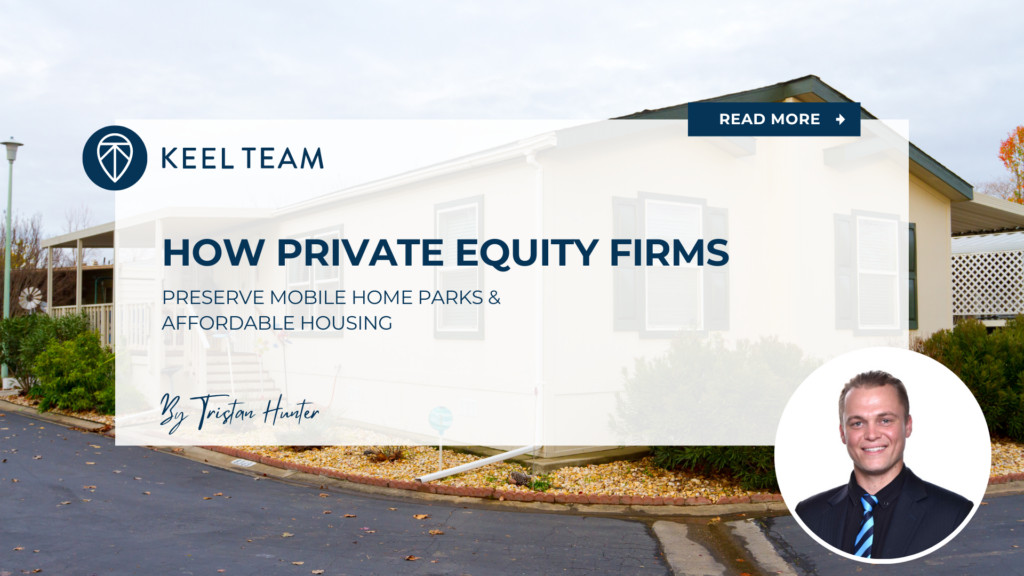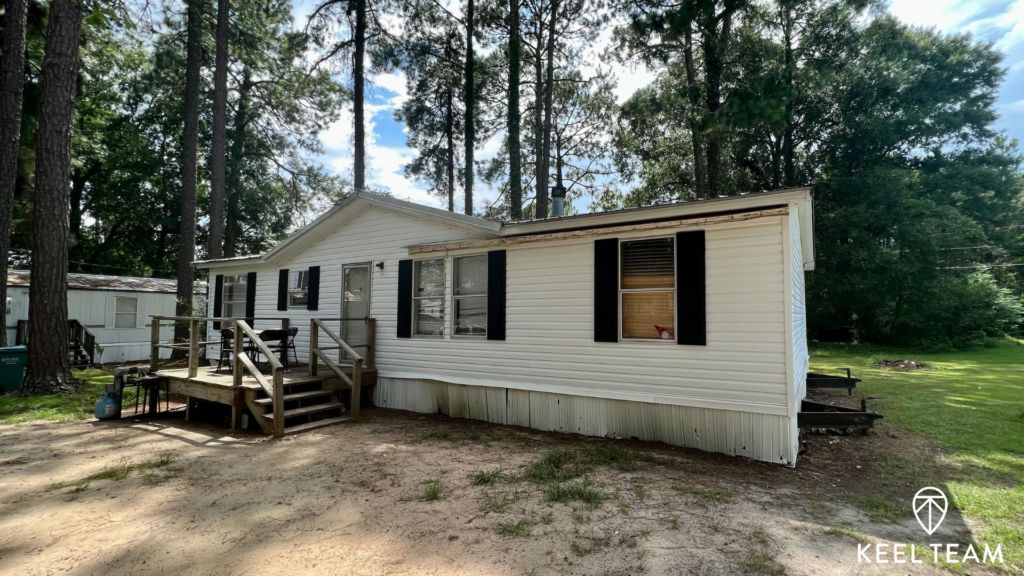How Private Equity Firms Preserve Mobile Home Parks & Affordable Housing
-
 Tristan Hunter - Investor Relations
Tristan Hunter - Investor Relations

Private equity investment in mobile home parks is transforming this affordable housing asset class, balancing profitability with the preservation of vital, low-cost housing options. With demand for affordable housing surging, private equity is becoming an essential player in maintaining and improving mobile home parks across the United States. This article dives into how private equity investment drives value-add strategies, promotes financial sustainability, and helps preserve mobile home parks as a crucial form of affordable housing.
Why Mobile Home Parks Matter in Affordable Housing
Mobile home parks play a critical role in providing affordable housing for millions of Americans. According to the Manufactured Housing Institute, more than 22 million people in the U.S. live in manufactured homes. Mobile home parks offer a low-cost alternative to traditional housing, with residents typically owning their homes but renting the land. This setup keeps housing costs significantly lower than those associated with apartments or single-family homes.
However, rising property values, strict zoning regulations, and aging infrastructure threaten the viability of mobile home parks, making private equity investment a crucial solution for preserving affordable housing. By infusing capital and employing value-add strategies, private equity firms are helping mobile home parks remain financially viable and sustainable for both investors and residents.
The Role of Private Equity in Affordable Housing & Mobile Home Park Investing
Private equity investment involves pooling funds from multiple investors to acquire and manage assets, including mobile home parks. For mobile home parks, this approach typically brings several benefits:
- Access to Capital: Private equity provides the necessary capital to invest in property improvements, maintenance, and infrastructure upgrades, which are critical for keeping mobile home parks safe and livable.
- Professional Management: By bringing in experienced management teams, private equity firms help ensure that mobile home parks are operated efficiently, keeping costs down for residents while maintaining profitability.
- Long-Term Stability: Unlike individual investors, private equity firms typically have long-term investment horizons. This approach helps ensure that mobile home parks are not just flipped for quick profits but are preserved as long-term affordable housing options.
In essence, private equity investments give mobile home parks the financial backing they need to remain affordable while typically still generating returns for investors.
Are you looking for mobile home park investing resources? Download our FREE eBook and learn more about partnering with an operator to invest in this space.
Value-Add Investing in Mobile Home Parks
A key strategy used by private equity firms in mobile home park investing is value-add investing. This involves purchasing underperforming or undermanaged mobile home parks and making improvements that increase the property’s overall value and income potential. Value-add strategies can include:
- Improving Infrastructure: Many mobile home parks suffer from deferred maintenance. Private equity investments fund repairs and upgrades to essential infrastructure, including water systems, sewage lines, and electrical grids. These improvements usually reduce ongoing operational costs and enhance the quality of life for residents.
- Filling Vacant Lots: Private equity firms often purchase mobile home parks with high vacancy rates. By investing in marketing and lot infill strategies, they can bring in new residents and increase occupancy. Filling vacant lots typically boosts revenue without significantly increasing costs, in turn making the mobile home park more profitable while keeping rents affordable.
- Billing Back Utilities: Private equity firms also implement utility bill-back programs, where tenants pay for their own water, gas, and electricity usage. Billing back utilities typically reduces the trailer park’s operational costs and also encourages tenants to be more mindful of their resource consumption.
- Gradual Rent Raises: Private equity firms typically align rent increases with improvements made to the property. By gradually raising lot rents in accordance with infrastructure upgrades and amenity enhancements, firms help ensure that rents remain fair and justifiable while improving the mobile home park’s overall profitability.
Through value-add investing, private equity firms generally increase the value of mobile home parks, providing a win-win situation for both residents and investors. However, while these strategies aim to improve returns, there are no guarantees, and success depends on market conditions and management effectiveness.
Preserving Affordable Housing Through Private Equity
One of the biggest concerns in today’s housing market is the diminishing supply of affordable housing. Mobile home parks, as a critical component of this sector, have faced increasing pressures from rising land values and redevelopment plans. Private equity investment offers a way to protect mobile home parks from being sold off for higher-end developments by keeping them financially viable.
Case Study: Keel Team’s Norfolk Mobile Home Park
Keel Team’s Norfolk, NE Mobile Home Park project illustrates how value-add investing can transform a struggling asset into a high-performing investment. Purchased for $2 million in 2020, the 90-lot mobile home park initially faced vacancy issues and outdated infrastructure. Keel Team implemented an infill strategy, removing old homes and upgrading infrastructure like parking pads and water systems. These improvements increased occupancy and allowed for modest rent raises, boosting overall revenue.
After two years, the team executed a cash-out refinance, generating over $1.6 million in proceeds. This move provided significant returns to investors, with a total annualized ROI of 105%. Investors also benefited from cash flow distributions, and many achieved infinite returns after the refinance.
This project highlights how private equity firms can use value-add strategies to preserve mobile home parks while maintaining affordability and potentially delivering substantial returns for investors.

The Broader Impact on Manufactured Housing
Private equity investment not only benefits individual mobile home parks but also has a broader impact on the manufactured housing industry. By investing in mobile home parks, private equity firms help:
- Increase Supply of Affordable Housing: By preserving and improving mobile home parks, private equity firms help ensure that affordable housing remains available in areas where it is needed most.
- Enhance Industry Standards: Private equity typically brings professional management and standardized practices to mobile home parks, raising the overall quality of mobile home communities.
- Support Economic Stability: Mobile home parks offer housing to a significant portion of the workforce, particularly in rural and suburban areas. Private equity investments usually keep these trailer parks operational and affordable, supporting local economies.
According to the Urban Institute, manufactured housing is the largest source of unsubsidized affordable housing in the U.S., making the role of private equity in preserving this asset class critical.
Challenges and Considerations
Private equity investments in mobile home parks face certain challenges. Residents often worry that new ownership will increase rents and make living unaffordable. While value-add strategies may involve slight rent increases, responsible private equity firms align these with market rates to avoid displacing tenants.
Investors must also avoid over-leveraging properties. Mobile home parks typically rely on cash flow, and excessive debt can cause financial instability. To ensure long-term success, investors should prioritize sustainability over quick profits.
Conclusion: The Future of Mobile Home Park Investing
Private equity investment is playing a vital role in preserving mobile home parks and supporting the availability of affordable housing across the U.S. By employing value-add strategies, private equity firms help ensure that mobile home parks remain a viable, affordable housing option while also providing solid returns for investors.
As the demand for affordable housing continues to grow, private equity firms will likely remain key players in mobile home park investing. With their capital, expertise, and long-term vision, these firms help sustain the mobile home park asset class and provide much-needed affordable housing to millions of Americans.
Book a 1-on-1 consultation with Andrew Keel to discuss:
- A mobile home park deal review
- Due Diligence questions
- How to raise capital from investors
- Mistakes to avoid, and more!
Disclaimer:
The information provided is for informational purposes only and is not investment advice or a guarantee of any kind. We do not guarantee profitability. Make investment decisions based on your own research and consult registered financial and legal professionals. We are not registered financial or legal professionals and do not provide personalized investment recommendations.

Tristan Hunter - Investor Relations
View The Previous or Next Post
Subscribe Below 👇





